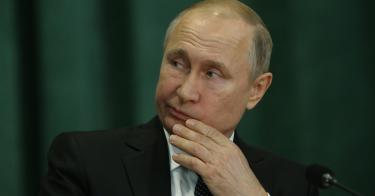In a rare show of bipartisanship, the House has overwhelmingly voted in favor of a bill to block the Treasury Department from lifting sanctions on three Russian companies linked to oligarch Oleg Deripaska. Unfortunately, that across the aisle agreement may be for naught. Senate Majority Leader Mitch McConnell has already countenanced one successful filibuster against a similar sanctions bill originating in the upper chamber and is unlikely to bring the House legislation to the floor. It is indeed a shame.
If any Russian oligarch deserves sanctions, it is Deripaska. A billionaire several times over, he enjoys powerful connections and tremendous influence inside the Kremlin. He also has a long history of confrontation with American authorities. In the last decade, he was denied an American business visa to the United States because of alleged links to organized crime in Russia. He reportedly skirted this federal ban by using a Russian diplomatic passport on the pretence of attending United Nations and Group of 20 events in the United States. In Moscow, connections pay off.
More recently, Deripaska has been named a person of interest in the federal investigation into Russian election hacking. He had business ties with former Trump campaign manager Paul Manafort, who was recently convicted of tax and bank fraud as a result of that ongoing investigation. Last year, the United States put Deripaska on its sanctions list alongside two of his companies, aluminium giant Rusal and its parent company EN+. But soon, Treasury Secretary Steven Mnuchin suggested that sanctions against Rusal and EN+ could be lifted could be lifted if Deripaska shows he no longer holds majority shares in the companies.
Since then, a team of lawyers and lobbyists employed by Deripaska and his companies have been working overtime to convince the Office of Foreign Assets Control to lift the sanctions. Last month, the Treasury Department announced it would do just that. According to announced deal, Deripaska has reduced his share in Rusal from 70 percent to 35 percent. It should be noted, however, that two of his relatives control another 7 percent, giving him effective control of 42 percent of the company. As for Deripaska himself, he will remain under sanctions.
This move to lift economic sanctions against the companies fails to see the bigger geopolitical picture. The decision to remove Rusal and EN+ from sanctions sends the wrong signal to Moscow and will weaken resolve in Europe when it comes to our allies there making use of sanctions. Many countries in Europe with uncomfortably close economic links to Russia are looking for an excuse to reduce sanctions against Moscow. The Treasury Department decision gives them more ammunition to make their case.
The case for sanctions remains as strong as ever. As the largest Russian producer of aluminium, Rusal and EN+ have been responsible, at least in part, for producing the Russian war machine that has run roughshod over Ukraine, Syria, and Georgia. Even if Deripaska had nothing to do with Rusal, the case for sanctioning Rusal is quite strong. It does not matter if he controls 70 percent or 1 percent of the company. Rusal is working against American interests and helping Russia violate international law.
There is no question that the economic sanctions have started to bite. Proof of this includes the great lengths Deripaska has gone to get Rusal and EN+ removed from the sanctions list. There is no good reason to render the sanctions toothless now. Russian troops still occupy Crimea and 20 percent of the territory in Georgia. In Syria, Vladimir Putin is still propping up Bashar Assad, prolonging the suffering and killing there.
Meanwhile, Moscow continues to meddle in the electoral and democratic processes in the United States and across Europe. Rather than ease the economic sanctions against the inner circle of players close to the Kremlin, the United States should instead consider working with our allies to increase them. Now is certainly not the time to go easy on Russia.
This piece originally appeared in The Hill 1/18/19



